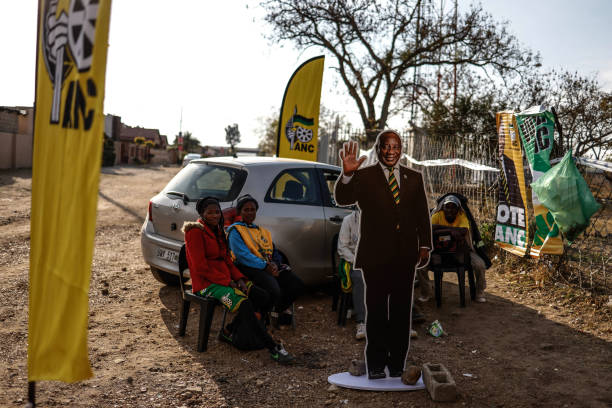
TOPSHOT - A cardboard cut out of African National Congress (ANC) leader and South African President Cyril Ramaphosa stands next to ANC political party agents outside Dorothy Langa School in Sheshego on May 28, 2024, a day before the South African elections. (Photo by PAUL BOTES / AFP) (Photo by PAUL BOTES/AFP via Getty Images)
In a world where social media, technology, and rapid change drive global conversations, youth engagement in politics is more critical than ever. Yet, the African National Congress (ANC) has struggled to genuinely connect with South Africa’s youth, missing out on the chance to harness the energy, creativity, and ideals of the next generation. While the ANC has historically been a powerful force for change, today’s young South Africans are calling for something new—something that resonates with their unique challenges, values, and dreams for the future.
The Youth Disconnection: Why It Matters
South Africa’s youth, representing nearly 60% of the population, holds immense potential for shaping the nation’s future. However, high youth unemployment, inadequate access to education, and a sense of political disillusionment have left many young people feeling ignored and disconnected. This disconnection is evident in recent election data, showing low voter turnout among young citizens—a clear sign that the ANC’s current messaging is falling short.
For the ANC, which once thrived on the energy of youth-led movements, this disconnect represents more than just a missed opportunity; it’s a fundamental challenge to their relevance. Failing to engage this critical demographic means not only losing votes but also losing touch with the voices that will drive future progress. So, what’s gone wrong, and what can be done?
ANC’s Current Approach to Youth Outreach: A Critique
The ANC’s existing strategies for engaging youth often lack depth and relevance. While the party makes general statements about empowering youth, its initiatives rarely translate into meaningful change. Here are a few areas where the ANC’s approach falls short:
- Outdated Messaging: Much of the ANC’s rhetoric fails to address the issues that matter most to today’s young people, such as digital transformation, climate change, and education reform. Without connecting to the real-world concerns of young citizens, the ANC’s messaging can seem out of touch.
- Inadequate Platforms for Engagement: While the ANC maintains a presence on social media, its engagement is largely one-sided. Today’s youth crave interaction, transparency, and accountability—values that the ANC’s top-down communication style doesn’t easily accommodate.
- Lack of Visible Young Leaders: Although the ANC includes youth representatives, they rarely hold prominent decision-making positions. This lack of representation leaves young South Africans with few relatable figures within the party and sends the message that they are merely spectators rather than active participants.
- Failure to Address Economic Issues: South Africa faces one of the highest youth unemployment rates globally. The ANC’s economic policies often fall short of providing sustainable solutions for this problem, leaving young people with limited opportunities for growth and financial independence.
What a Progressive Approach to Youth Engagement Looks Like
To truly connect with young South Africans, the ANC must adopt a more progressive, youth-focused strategy. This would require rethinking policies, refreshing its approach to communication, and making structural changes to involve youth meaningfully. Here’s what a youth-driven, progressive approach might look like:
- Empowering Young Leaders: The ANC needs to elevate young voices to decision-making roles, not just token positions. Having young representatives in visible, powerful roles can create an immediate connection and give youth a stake in shaping their own future.
- Engaging on Relevant Issues: Young people are vocal about issues that affect them directly, such as climate action, internet accessibility, and job creation. By developing policies that tackle these issues head-on, the ANC could reframe itself as a champion of the causes that resonate with today’s youth.
- Rethinking Education and Economic Policies: A robust economy starts with empowered youth. The ANC should push for reforms in education that include vocational training, digital literacy, and entrepreneurship. These changes would equip young people with the skills needed to thrive in a modern economy and reduce dependency on traditional, limited job markets.
- Two-Way Communication and Transparency: Today’s youth expect transparency and accountability. The ANC can foster real engagement by implementing open forums, live Q&A sessions, and creating digital platforms where youth can discuss policy issues, offer input, and feel heard.
- Promoting Civic Participation Beyond Voting: Voting is just one form of civic engagement. The ANC can boost political involvement by promoting volunteer programs, internships, and community initiatives that allow young people to contribute actively to their communities. Such programs would not only build civic pride but also provide practical experience in governance and public service.
A Call to Action for the ANC
If the ANC hopes to stay relevant in an era of rapid change, it must embrace and invest in South Africa’s youth. This shift means acknowledging the unique challenges young South Africans face and adapting policies to address these realities. By elevating young leaders, embracing two-way communication, and focusing on the issues that matter, the ANC can create a meaningful bond with the next generation.
For a party that once thrived on the power of youth, the ANC has everything to gain by rekindling that spirit. Now is the time for a progressive approach that not only acknowledges the voices of young South Africans but amplifies them, ensuring that the country’s future is shaped by those who will inherit it. Only through genuine engagement can the ANC hope to regain the trust, enthusiasm, and support of South Africa’s next generation.



